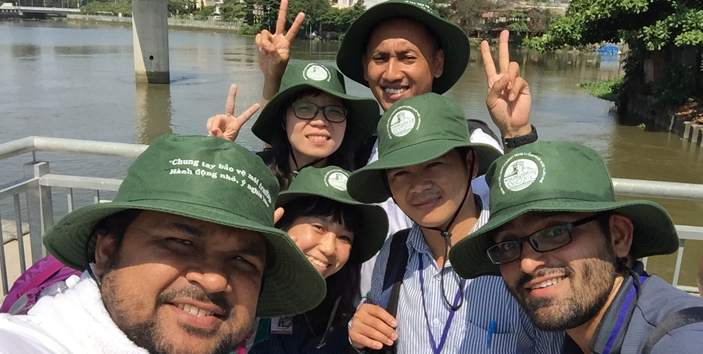ProSPER.Net recently concluded yet another successful Young Researchers’ School (YRS), in Vietnam. ProSPER.Net would like to thank Vietnam National University in Ho Chi Minh City acting as a host for the School as well as all other ProSPER.Net members that helped promote the Programme and enlist their PhD students.
16 PhD students from 11 ProSPER.Net institutions from nine countries around Asia and the Pacific journeyed to Ho Chi Minh City and the surrounding Mekong Delta to learn firsthand from local and international experts about the impacts of climate change, sea level rise, and illegal water use in the region. The ten-day YRS 2017 was divided into lectures, field visits, and writing workshops. Students were provided with a breadth of topics related to water security, policy and practices of river basin management in the Mekong Delta, and environmental impact assessment of fresh water ecosystems as a tool for pollution prevention.
Participants from the Asia Pacific region journeyed to Ho Chi Minh City and the surrounding Mekong Delta to learn firsthand about the impacts of climate change, sea level rise, and illegal water use on the region. The Mekong Delta provides food not only for much of Vietnam, but is also an increasingly important agricultural export market, both within the region and globally.
During the first week, lectures were held on water security and storage in and around Ho Chin Minh City, policy and practice of river basin management in the Mekong Delta, and environmental impact assessment of freshwater ecosystems. Faculty from Vietnam National University in Ho Chi Minh City and foreign NGO representatives gave additional lectures on how to prevent salinity intrusion into the region, and on how local government administrators do water management in the Mekong Delta. The students also visited flood prevention infrastructures and water treatment facilities around the city. This was particularly interesting relative to Ho Chi Minh City’s plan to expand fresh water access in the near future and the city’s contingency plans for flood control.
During the field visit to Tram Chim National Park on the Cambodian border, students could observe the unique role wetlands have in biodiversity preservation. They learned about the delicate balance between park management, wildlife protection, prevention of forest fires, and allowing for local agriculture. Next on the agenda was a trip to Can Tho province, where students learned about climate change in the Mekong Delta from Can Tho University. The group moved on to a salinity control gate in Cen Tre province. Many of the salinity control gates in the region are being developed by the Vietnamese government in cooperation with Japanese, German, and Dutch aid programmes, giving students a chance to witness international cooperation on the construction of infrastructure projects in response to climate change.
Students prepared their individual research proposals to investigate water security issues in Vietnam. Based on research themes the participants were divided into four groups:
- Group I: Water resource quality assessment
- Group II: Water and waste water treatment
- Group III: Infrastructure development under changing climate conditions
- Group IV: Developing planning policy under changing climate conditions
These groups developed a research question with specific objectives and outcomes, a set of methodologies, data sources and a timeline to set the groundwork for the proposed project. The students put together four proposals that were presented on the final day of the School, and received feedback from both faculty at the hosting institution and UNU-IAS researchers. More information on these proposals will be shared soon.
Additionally, participants were asked to facilitate one of the lectures during the field school, and to write a lecture summary to share with the class at the end of the programme. During the three-minute-thesis competition, students presented their own doctoral research, using a single slide and only three minutes. The competition produced presentations, with dynamic, creative, and enlightening narratives around student’s individual PhD research. Helen Corney (RMIT University) took first place, with Huong Giang Pham (RMIT University) and Mostafizur Rahman (Hokkaido University) as runners-up. During the final Life After PhD session, panelists from academia, research institutes, and government, described potential career paths for PhD holders.
Outcomes of the School can be found here.
Photos have been uploaded on facebook.

